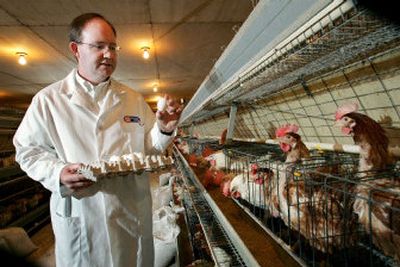Eggland’s best idea

CEDAR KNOLLS, N.J. – When Eggland’s Best Inc. launched its low-fat, low-cholesterol eggs in 1992, U.S. egg consumption was at its lowest point in decades as dieters and others spurned cholesterol-rich foods.
That gave the company a big advantage over generic eggs, and a clear marketing strategy, executed with TV ads depicting mothers and grandmothers happily feeding their families Eggland’s eggs.
The ads and the eggs’ health benefits have helped to boost revenues at the tiny New Jersey company by double digits for nine straight years. Retail revenues from Eggland’s eggs – which sell at a premium of up to $1 a dozen over regular eggs – totaled about $200 million last year, with about $27 million going to the corporation and the rest to grocery stores and to Eggland’s Best farmers, who hold franchises.
Compared with regular eggs, Eggland’s have 25 percent less saturated fat, 15 percent less cholesterol and several times more vitamin E and omega-3 essential fatty acids, which both are believed to reduce risk of heart disease and other disorders. Eggland’s eggs also contain more of the essential mineral iodine and lutein, an antioxidant thought to boost the immune system and help prevent cancer and the eye disorder macular degeneration.
“The good things we’re better on and the bad things we’re lower on,” said Eggland’s president and chief executive officer, Charlie Lanktree, whose enthusiasm for his wares rivals that of chicken magnate Frank Perdue. “The perfect food just became more perfect.”
That’s accomplished by feeding hens a carefully controlled vegetarian diet, patented under the unwieldy title, “Egg Compatible With Cholesterol Reducing Diet and Method of Producing the Same.”
Plenty of consumers are willing to pay a premium for “specialty eggs” such as Eggland’s, which include nutritionally enhanced, organic and cage-free and free-range varieties.
“The specialty egg segment has grown dramatically in the last eight or nine years,” said Alan Andrews, director of marketing at Pactiv Corp., the world’s top supplier of egg cartons.
The number of specialty eggs sold jumped from 40 million dozen in 1999 to more than 90 million dozen last year. Roughly 5 percent of the volume of fresh egg sales and 11 percent of the approximately $3 billion in revenues went for specialty products in 2005, according to data from Pactiv and market researcher AC Nielsen.
Other specialty brands include Organic Valley, Chino Valley Ranchers, Christopher Eggs, Land O Lakes and Egg Beaters, which are nutritionally enhanced egg whites.
Reasons for Eggland’s premium price include higher costs for feed and care of the hens and strict quality control. About 250,000 eggs are rejected each day for defects in shell quality and other factors, said Bart Slaugh, director of quality assurance and head of the company research facility in Chester County, Pa., where scientists tinker with their vegetarian feed formula.
U.S. egg consumption, which averaged 310 a person a year in 1970, declined to 234 per person in 1991, mainly because of cholesterol concerns. Amid the recent popularity of high-protein diets, egg consumption has rebounded to 257 eggs a person, according to the Egg Nutrition Center.
“New studies show that the caution against eating eggs may have been an overexaggeration,” said American Dietetic Association spokeswoman Katherine Tallmadge.
Eggland’s claims numerous awards and citations. Even the American Vegetarian Association has certified Eggland’s products as meeting its standards.